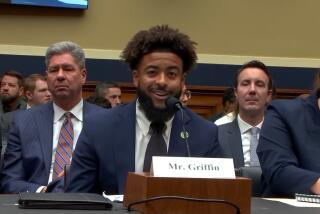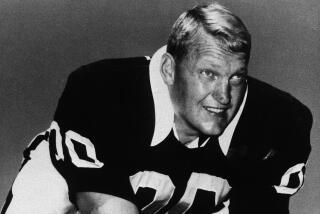OTTO GRAHAM : He’s Calling New Signals--This Time Against Particularly Threatening Foe
- Share via
Hall of Fame quarterback Otto Graham has started a new career this year.
He’s a cancer fighter.
A recovered cancer patient--he beat the disease seven years ago--he is making speeches and radio-TV appearances from coast to coast.
It is Graham’s third career in a half-century.
As a pro athlete in 1946-55, he won acceptance as one of the most successful football players ever, leading the Cleveland Browns to 10 consecutive championship games--all four in the old All-America Conference and then six straight in the National Football League.
The Browns won seven of them, beating the Rams twice--in 1950 and 1955--in Super Bowl forerunners.
Next, Graham spent a quarter-century in the U.S. Coast Guard--much of it as a football coach--with three years off to coach the Washington Redskins.
After rising to captain, he retired from the Coast Guard Jan. 1.
Now, at 63, he is touring America, proclaiming what he calls an urgent message to the country. That same message has been massively unheeded, so far, when voiced by others.
“The message is that early detection can save your life,” Graham said in Los Angeles the other day. “I tell everyone from Rotary Club members to high school students that cancer doesn’t discriminate between men and women, or between athletes and sports fans. What I’m saying is, ‘Wake up. And check up.’ ”
In the last 15 years, two of the nation’s most prominent football men--Graham and former Green Bay Packer Coach Vince Lombardi--were stricken with similar forms of colorectal cancer, which kills more Americans annually than auto accidents. It is the disease’s No. 2 killer behind lung cancer.
Lombardi died. Graham underwent a colostomy operation and survived.
“If Lombardi had had access to one of today’s simple do-it-yourself cancer tests--and used it--he probably would have lived,” Graham said. “If they’d had such a test 7 1/2 years ago--and I’d used it--I probably would have avoided surgery.”
Useful methods of easy, do-it-yourself testing for colorectal disorders are now available without prescription in drug stores, Graham said.
“A quick telephone call to your physician gets you all the information,” he added.
Graham is a 6-footer weighing 210--five pounds over his NFL playing weight--and he looked both fit and vigorous on his latest trip to Los Angeles, where he seemed equally at home discussing football or medicine.
During the first of his three careers, Graham recalled, it was the Rams who broke his five-year title-game winning streak, earning their only NFL championship in 1951 on a long touchdown pass from Norm Van Brocklin to Tom Fears. But in his final NFL game, Graham returned to Los Angeles and helped the Browns win the 1955 title at the Coliseum.
One of the few college players to make All-American in both football and basketball--he played at Northwestern--Graham doesn’t begrudge modern athletes their million-dollar salaries.
“I tell them to keep making it and keep paying those taxes,” he said. “I tell them it takes a lot of money to pay my Coast Guard pension.”
Graham was actually a highly overpaid athlete in his time.
“I was getting a naval cadet’s pay in World War II, when (Cleveland Coach) Paul Brown came out to the station one day and offered me a two-year contract at $7,500 per,” he said. “He also offered me a $1,000 bonus and $250 a month for the duration of the war. All I asked was, where do I sign? Old Navy men say I rooted for the war to last forever.”
It didn’t, but by 1955, drawing a $25,000 salary, Graham was the NFL’s highest-paid player. He earned it as a running-passing quarterback.
“That was Dan Marino’s trouble in the Super Bowl,” Graham said. “Marino can’t run. And he had his first bad day as a passer in two years. Some people say San Francisco’s defense won the game, but I thought it was obvious from the first quarter on that Marino was just having an off day. We all have them. In one big (NFL title) game, I only completed two passes in something like 17 throws.”
Graham’s wife, Beverly, who was with him in Los Angeles, said the 49ers’ Joe Montana is more like Otto than any other modern quarterback.
“Montana’s running won the Super Bowl,” said Graham, whose own running had won the NFL title game 35 years earlier in Cleveland against the Rams.
In the beginning, runner-passer Graham also punted. He was a triple-threat tailback a half century ago on a high school single-wing team in Waukegan, Ill., where his father was the school’s band director.
Basketball has always been Otto’s best sport, however, and it was a basketball scholarship that got him to Northwestern, where he majored in music.
He was a triple-threat musician, too, playing violin, cornet and French horn.
At Northwestern, he won nine letters: four in basketball, three in football and two in baseball. He still holds the university’s third-highest batting average.
Graham moved into pro sports as a basketball player in 1945-46 with the old Rochester Royals, now the Kansas City Kings.
“The Fort Wayne Zollner Pistons had dominated basketball up to my day,” Graham said. “We beat them seven times.”
The pro basketball title that Rochester won that season--combined with Cleveland’s first seven pro football titles--made Graham an eight-time national champion in only 10 years of major league team sports.
On a Rancho Mirage golf course in the desert last week, Graham was showing some of the touring woman pros how to drive the ball when one of his tee shots went 260 yards.
“I was rather proud of that,” he said later. “Then JoAnne Carner got up there--she’s 5-6, and maybe 60 pounds smaller than me--and drove one 10 yards past my ball. It’s hard to believe how much better these athletes are today.”
It’s also typical of Graham that he doesn’t mind telling friends or strangers how a woman outplayed him. His sense of self-worth is ample. Thus he is a man who can discuss his defeats and his personal problems without awkwardness.
That is what makes him invaluable on the cancer circuit, where he talks about his rectal surgery--and how to avoid it--freely and with no trace of embarrassment.
“Too many people stick their head in the sand,” he said. “They’re afraid to find out even the simplest truths about cancer. They have to be warned that procrastination is the road to death.”
A major problem area, he warns repeatedly, is that the early symptoms of colorectal cancer can’t be seen by the naked eye and only turn up in regular tests or checkups. Persons over 40 are particularly vulnerable.
How reliable are today’s do-it-yourself cancer tests?
Said Dr. Jay Gorsky, director of chemistry at Good Samaritan Hospital, “If all the conditions are met, they’re quite reliable, and they’re being used more widely all the time.”
From Los Angeles, Graham returned to his winter home at Sarasota, Fla., where he plays golf to an 11 handicap and gardens.
The Grahams also maintain a summer home in Connecticut, where he also golfs and gardens.
“The winning formula is the same for both pastimes,” he said. “They both need tender loving care.”
There are three Graham children, two foster daughters and, he said, “13 1/2 grandchildren.”
That doesn’t quite add up.
“One of my foster daughters is pregnant,” he said.
More to Read
Go beyond the scoreboard
Get the latest on L.A.'s teams in the daily Sports Report newsletter.
You may occasionally receive promotional content from the Los Angeles Times.










